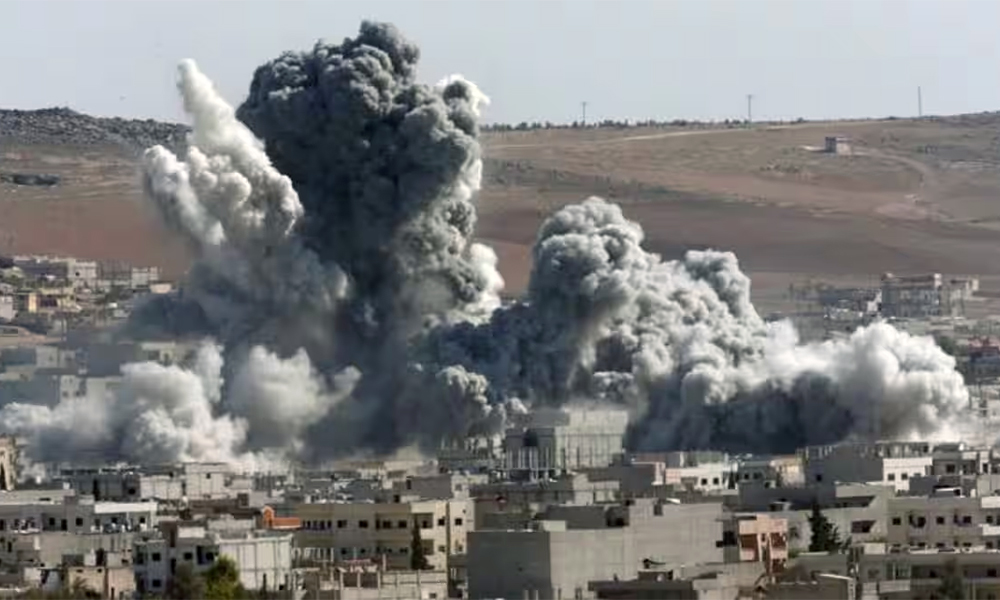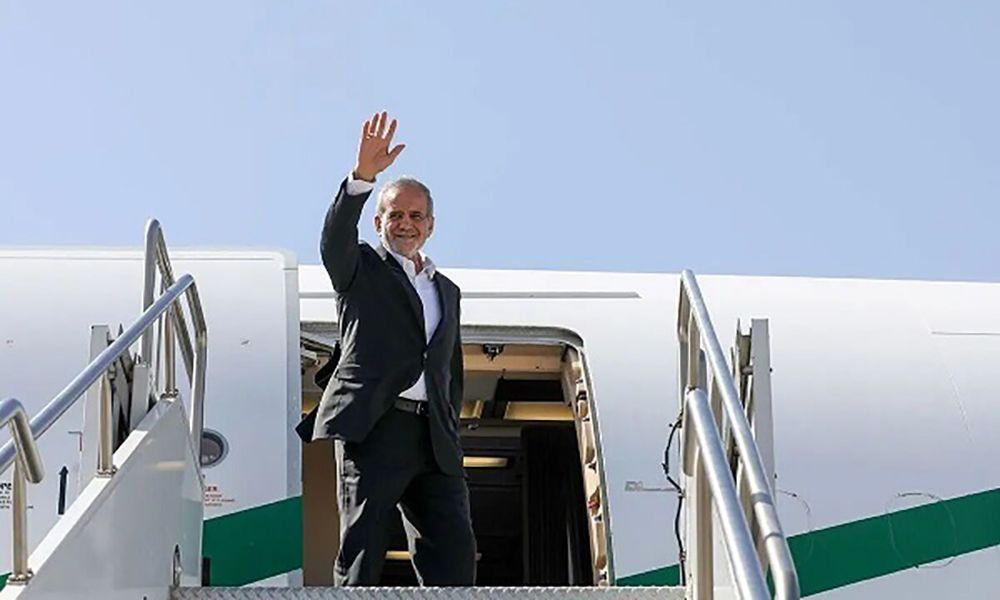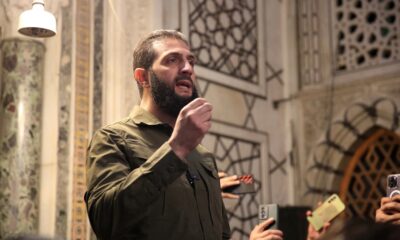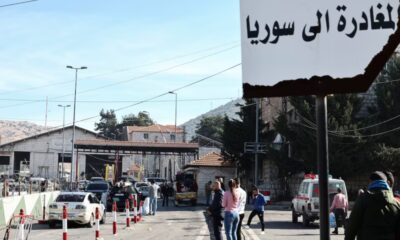Regional
US strikes Iranian targets in Syria: Pentagon

The U.S. military carried out strikes against two facilities in eastern Syria used by Iran's Islamic Revolutionary Guard Corps and groups it backs, the Pentagon said on Thursday, in response to a spate of attacks against U.S. forces in both Iraq and Syria, Reuters reported.
As tensions soar over the Israel-Hamas conflict, U.S. and coalition troops have been attacked at least 19 times in Iraq and in Syria by Iran-backed forces in the past week.
A total of 21 U.S. forces have suffered minor injuries, the vast majority of them traumatic brain injuries.
"These precision self-defense strikes are a response to a series of ongoing and mostly unsuccessful attacks against U.S. personnel in Iraq and Syria by Iranian-backed militia groups that began on October 17," U.S. Defense Secretary Lloyd Austin said in a statement.
The strikes were ordered by President Joe Biden, Reuters reported.
"These Iranian-backed attacks against U.S. forces are unacceptable and must stop," Austin said in the statement.
"If attacks by Iran's proxies against U.S. forces continue, we will not hesitate to take further necessary measures to protect our people."
The strikes took place at roughly 4:30 a.m. on Friday in Syria (0130 GMT) near Abu Kamal, a Syrian town on the border with Iraq, and were carried out by two F-16 fighter jets using precision munitions, a senior U.S. official, speaking on the condition of anonymity, said.
The targets were weapons and munitions storage facilities, the official added, speaking late on Thursday to reporters in Washington, read the report.
The United States has occasionally carried out retaliatory strikes against Iranian-backed forces in the region after they attack American forces. In March, the U.S. military carried out multiple air strikes in Syria against Iran-aligned groups that it blamed for a drone attack that killed an American contractor.
President Biden has sent a rare message to Iranian Supreme Leader Ayatollah Ali Khamenei warning Tehran against targeting U.S. personnel in the Middle East, the White House said earlier on Thursday.
According to Reuters the United States has 900 troops in Syria, and 2,500 more in neighboring Iraq, on a mission to advise and assist local forces trying to prevent a resurgence of Islamic State, which in 2014 seized large swathes of both countries but was later defeated.
There is growing concern that the Israel-Hamas conflict could spread through the Middle East and turn U.S. troops at isolated bases into targets.
"What we want is for Iran to take very specific actions, to direct its militias and proxies to stand down," a senior U.S. defense official said.
The United States did not coordinate the strikes with Israel, the official added.
Last week off the coast of Yemen, a U.S. warship shot down more than a dozen drones and four cruise missiles fired by Iranian-backed Houthis.
During a false alarm at Al-Asad air base in Iraq last week, a civilian contractor died from cardiac arrest.
The United States has sent warships and fighter aircraft to the region since the Israel-Hamas conflict erupted on Oct. 7, including two aircraft carriers, to try to deter Iran and Iran-backed groups. The number of troops added to the region is in the thousands.
Reuters reported this week the U.S. military was taking new measures to protect its Middle East forces during the ramp-up in attacks by suspected Iran-backed groups, and was leaving open the possibility of evacuating military families if needed.
The measures include increasing U.S. military patrols, restricting access to base facilities and boosting intelligence collection, including through drone and other surveillance operations, officials say.
Regional
Iran’s president to make rare visit to Egypt for D-8 summit
Iran will discuss regional and bilateral affairs with the participating countries on the sidelines of the summit, Baghaei added.

Iranian President Masoud Pezeshkian will take part in a summit of big Muslim countries in Egypt on Thursday, Foreign Ministry spokesperson Esmaeil Baghaei said, the first visit by an Iranian president to Egypt in more than a decade, Reuters reported.
Egypt is hosting the summit of the D-8 Organization for Economic Cooperation, which also includes Bangladesh, Indonesia, Malaysia, Nigeria, Pakistan and Turkey.
Relations between Egypt and Iran have generally been fraught in recent decades but the two countries have stepped up high-level diplomatic contacts since the eruption of the Gaza crisis last year as Egypt tried to play a mediating role, read the report.
Iran's Foreign Minister Abbas Araqchi travelled to Egypt in October to discuss regional issues with Egyptian officials, while his Egyptian counterpart Badr Abdelatty travelled to Tehran earlier in July to attend Pezeshkian's inauguration.
"We have the important summit... known as D-8 in Egypt, the foreign minister will take part in the ministerial conference and then the summit will be held with the participation of the president," Baghaei said in a weekly televised news conference.
Iran will discuss regional and bilateral affairs with the participating countries on the sidelines of the summit, Baghaei added.
The D-8 was established in 1997 to improve cooperation between countries stretching from Southeast Asia to Africa.
Regional
Bomb kills chief of Russian nuclear protection forces in Moscow

A bomb hidden in an electric scooter killed a senior Russian general in charge of nuclear protection forces in Moscow on Tuesday, Russia’s investigative committee said.
Lieutenant General Igor Kirillov, who is chief of Russia’s Nuclear, Biological and Chemical Protection Troops, was killed outside an apartment building on Ryazansky Prospekt, which starts a road some seven km (4 miles) southeast of the Kremlin, Reuters reported.
“Igor Kirillov, the head of the radiation, chemical and biological protection forces of the armed forces of the Russian Federation, and his assistant were killed,” the investigative committee said.
Photographs posted on Russian Telegram channels showed a shattered entrance to a building littered with rubble and two bodies lying in the blood-stained snow.
Reuters footage from the scene showed a police cordon. A criminal case has been opened.
Russia’s radioactive, chemical and biological defense troops, known as RKhBZ, are special forces who operate under conditions of radioactive, chemical and biological contamination.
On Monday, Ukrainian prosecutors charged Kirillov in absentia with the alleged use of banned chemical weapons in Ukraine, the Security Service of Ukraine said, according to the Kyiv Independent.
Russia denies those accusations.
Britain in October sanctioned Kirillov and the nuclear protection forces for using riot control agents and multiple reports of the use of the toxic choking agent chloropicrin on the battlefield.
Regional
Hezbollah chief says group lost its supply route through Syria

Hezbollah head Naim Qassem said on Saturday that the Lebanese armed group had lost its supply route through Syria, in his first comments since the toppling of President Bashar al-Assad nearly a week ago by a sweeping rebel offensive.
Under Assad, Iran-backed Hezbollah used Syria to bring in weapons and other military equipment from Iran, through Iraq and Syria and into Lebanon. But on Dec. 6, anti-Assad fighters seized the border with Iraq and cut off that route, and two days later, rebels captured the capital Damascus.
"Yes, Hezbollah has lost the military supply route through Syria at this stage, but this loss is a detail in the resistance's work," Qassem said in a televised speech on Saturday, without mentioning Assad by name, Reuters reported.
"A new regime could come and this route could return to normal, and we could look for other ways," he added.
Hezbollah started intervening in Syria in 2013 to help Assad fight rebels seeking to topple him at that time. Last week, as rebels approached Damascus, the group sent supervising officers to oversee a withdrawal of its fighters there.
More than 50 years of Assad family rule has now been replaced with a transitional caretaker government put in place by Hayat Tahrir al-Sham, a former al Qaeda affiliate that spearheaded the rebel offensive.
Qassem said Hezbollah "cannot judge these new forces until they stabilise" and "take clear positions", but said he hoped that the Lebanese and Syrian peoples and governments could continue to cooperate.
"We also hope that this new ruling party will consider Israel an enemy and not normalise relations with it. These are the headlines that will affect the nature of the relationship between us and Syria," Qassem said.
Hezbollah and Israel exchanged fire across Lebanon's southern border for nearly a year in hostilities triggered by the Gaza war, before Israel went on the offensive in September, killing most of Hezbollah's top leadership.
-

 Latest News4 days ago
Latest News4 days agoAfghanistan seals T20I series victory over Zimbabwe
-

 World5 days ago
World5 days agoSyrian clerics in former Assad stronghold call for national unity, democracy
-

 Latest News4 days ago
Latest News4 days agoU.S. sentences Afghan man to 30 years in prison for narco-terrorism and witness tampering
-

 International Sports4 days ago
International Sports4 days agoMessi vs Ronaldo: A look at their market values over the years
-

 Latest News4 days ago
Latest News4 days agoInvestment in Afghanistan’s pharmaceutical sector reaches $300 million: Union
-

 Latest News5 days ago
Latest News5 days agoChinese, Tajik officials discuss Afghanistan
-

 Sport4 days ago
Sport4 days agoAfghanistan’s Gulbaddin Naib fined 15% of match fee for dissent
-

 Regional4 days ago
Regional4 days agoHezbollah chief says group lost its supply route through Syria























